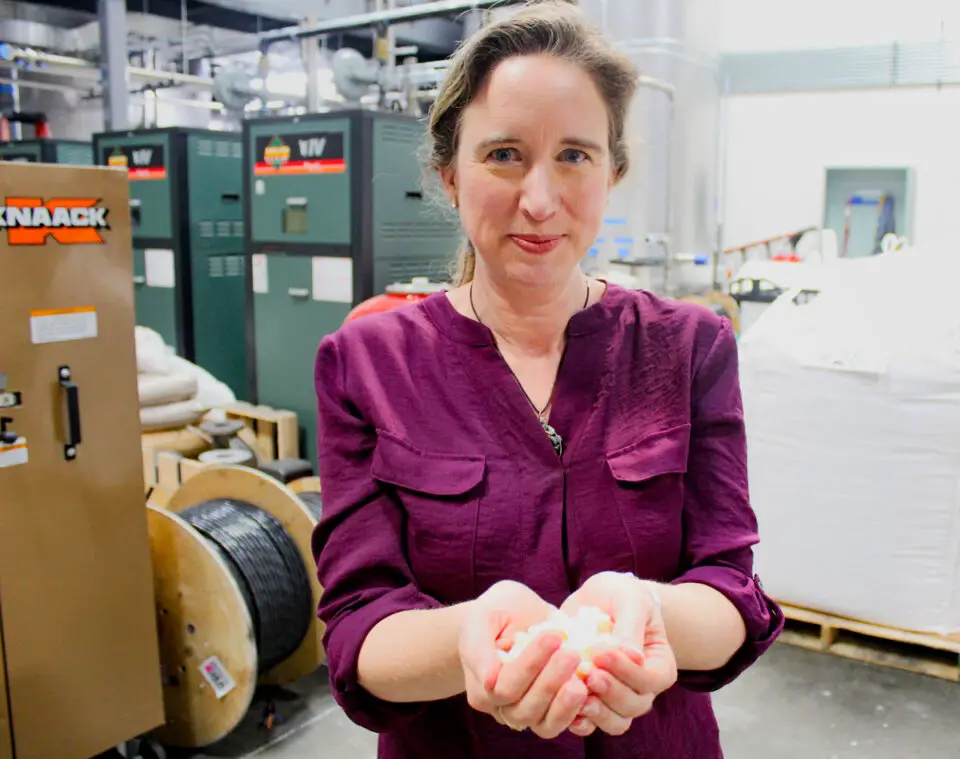VISTA — In the 75 years since its inception, Dr. Bronner’s Magic Soaps has expanded monumentally from a small Los Angeles operation with a counterculture message of peace, love and quasi-religious unity to one of the top natural soap makers in the world.
Emanuel Bronner, the company’s eccentric eponym carrying on the soapmaking tradition of earlier generations, founded Dr. Bronner’s in 1948. It began in his tenement apartment in Los Angeles but has operated for most of its life in North San Diego County, moving to Escondido in the 1960s and Vista in 2013.
Every day, thousands of soap bars, bottles of liquid soap, and other home and body products are prepared at the company’s massive factory and headquarters in Vista and shipped out to over 40 countries around the world.
Vista city officials formally recognized the company’s 75th anniversary with a formal proclamation earlier this month, received by CEO David Bronner and chief financial officer Trudy Bronner.
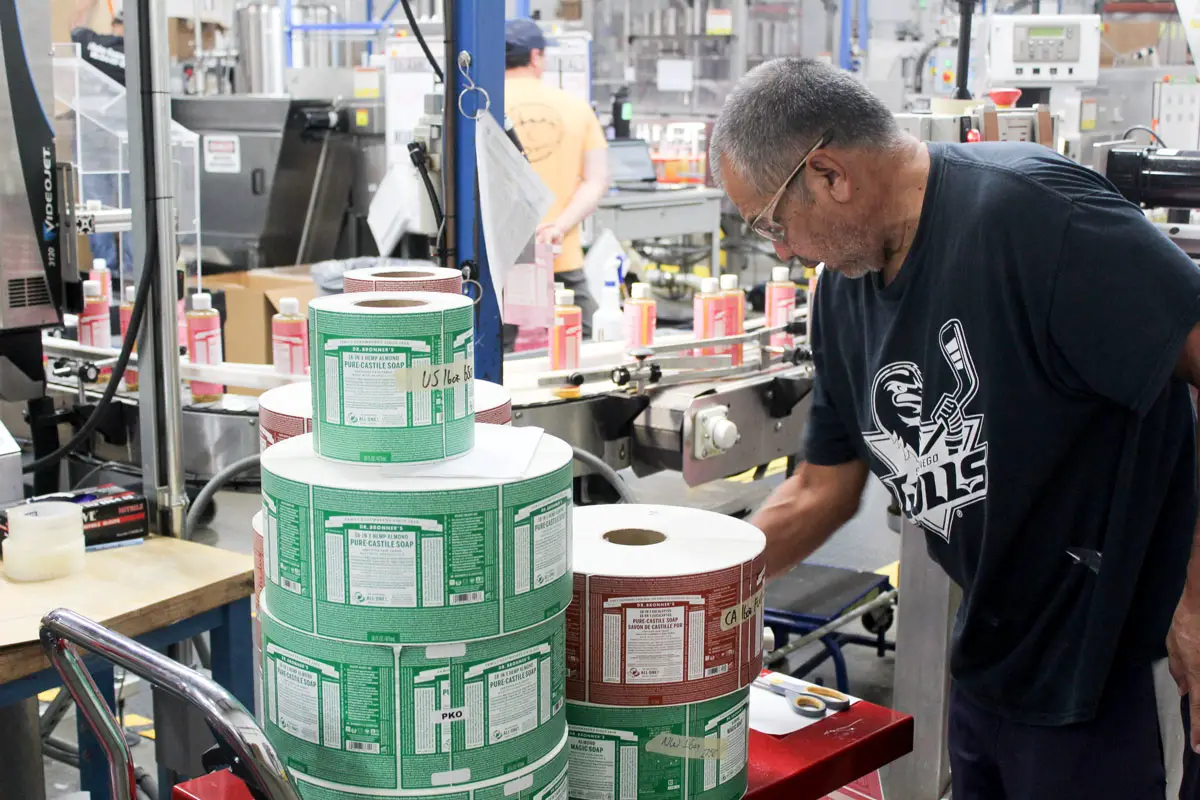
The proclamation honored Dr. Bronner’s “progressive and ethical business practices,” including its fair trade and organic practices, focus on regenerative organic agriculture, competitive wages and support of various environmental, human rights and drug policy causes, in addition to supporting local causes.
“Dr. Bronner’s is committed to demonstrating that business can be a force for good in the community and the world,” said Mayor John Franklin, reading from the proclamation.
Great success does not mean the company has abandoned its ideological principles of “All-One,” promoting a unified human race and care for the environment, tenants that are spelled out in the Moral ABC on the recognizable Dr. Bronner labels covered in tiny print.
In fact, Emanuel Bronner originally started selling soap as a way to share his message about world peace, using the label as a written manifesto. It has also remained a strong family company, with Emanuel’s grandchildren taking the helm in the past few decades.
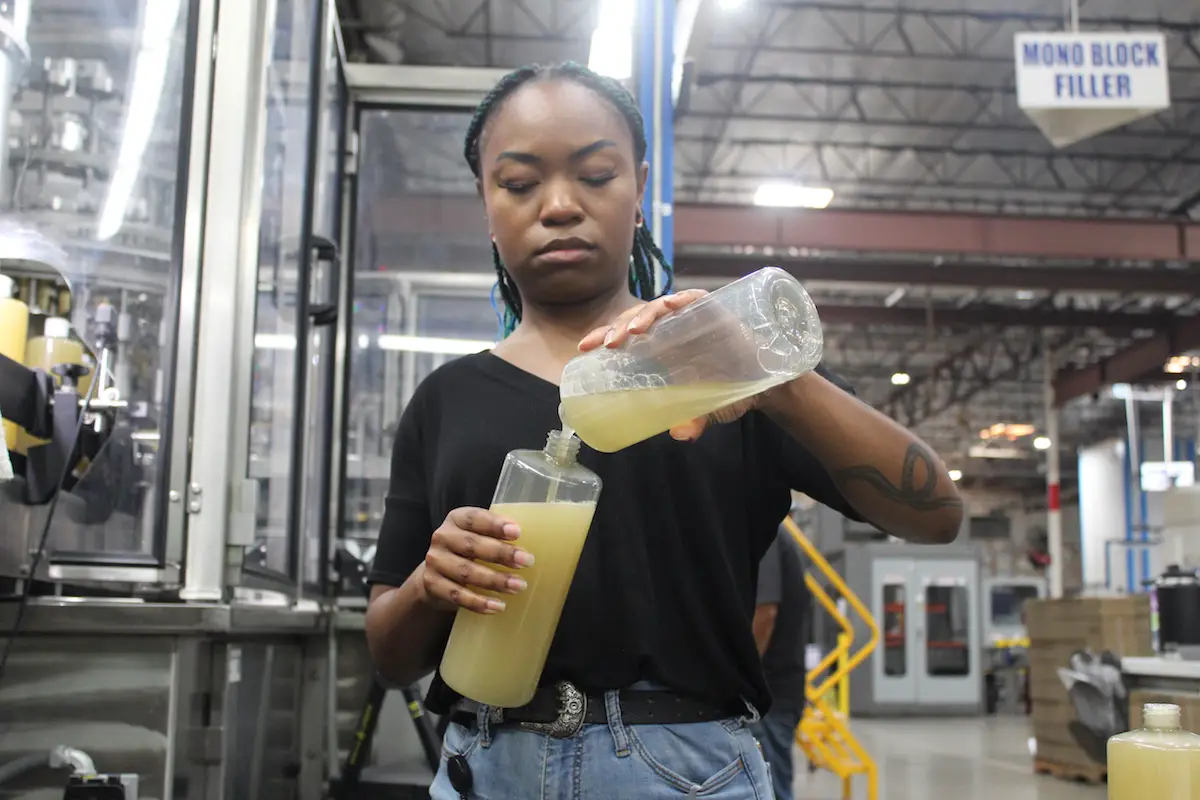
This includes CEO David Bronner, President Michael Bronner, and Lisa Bronner, the company’s consumer educator and founder of “Going Green with Lisa Bronner,” which provides resources and tips for how to effectively use Dr. Bronner’s products.
Lisa Bronner said Dr. Bronner’s was ahead of its time with its focus on organic and “green” products and world peace and that today, the company isn’t one to put out new products in order to follow trends.
“It takes us a long time to come out with a new product. We want to make sure it’s going to be around for a while,” Lisa Bronner said.
This commitment to longevity, simple sustainability and transparency is mirrored in the process of soapmaking itself, which has gone largely unchanged for thousands of years.
Soap is created via a one-step chemical reaction between fat and alkali, which produces water, glycerin and soap. When making bar soap, Dr. Bronner’s separates the water and treats it for reuse, while the soap is dried and cut into small pieces called “noodles” before being mixed with essential oils and made into a smooth bar.
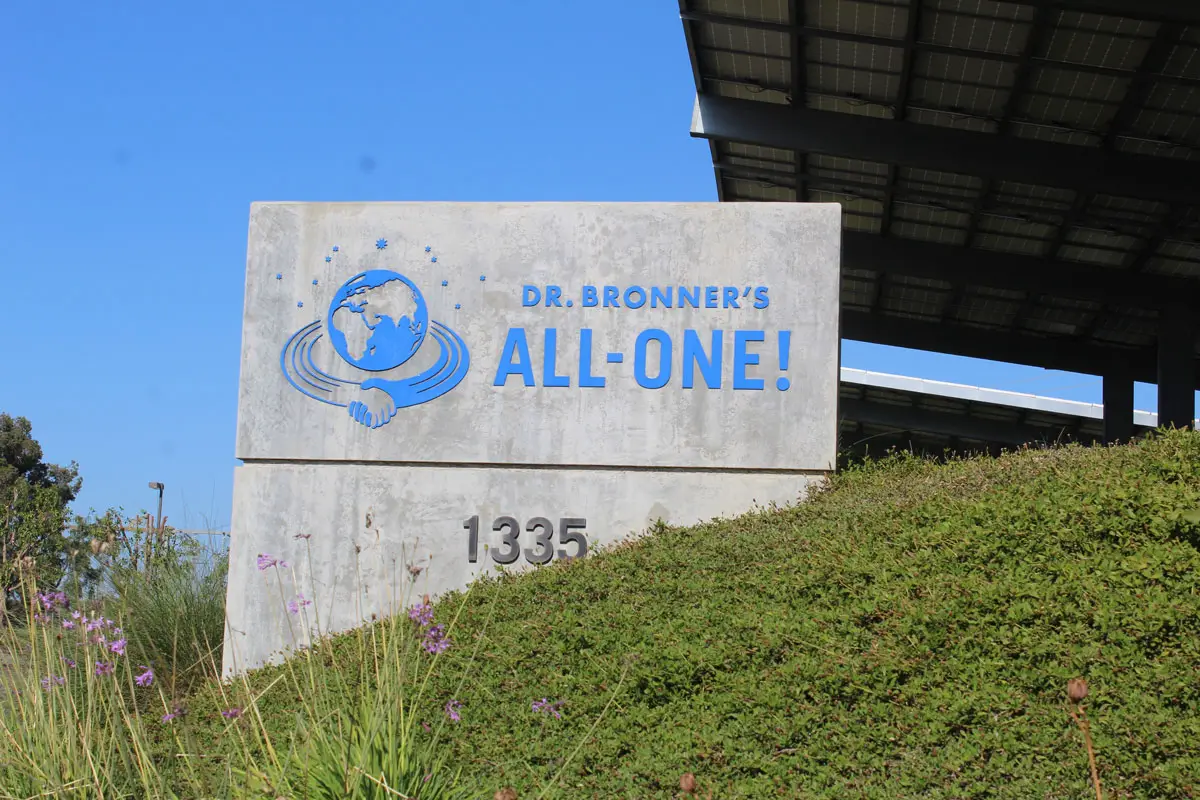
One of their more recent products actually has nothing to do with soap. In 2021, the company released a line of vegan, fair-trade chocolate bars in collaboration with the farmers in Ghana, who, along with growing and supplying Dr. Bronner’s organic and fair-trade palm oil used in soaps, also happen to grow cocoa.
Family business
As a child, Lisa Bronner remembers being in the Escondido factory, where employees filled, labeled and packaged soap bottles by hand, creating a much quieter operation than that of the mechanized Vista factory.
The Vista location, which is around 10 times larger than the previous site, now utilizes machines to create the liquid and bar soap, fill bottles, apply labels and package them into boxes. A line of large tanks holding liquid soaps are color-coded by scent — dark blue for peppermint, purple for lavender, red for rose, and so on.
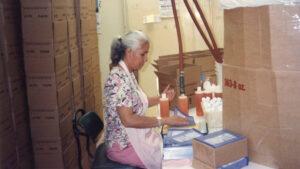
Even with machines increasing efficiency, Dr. Bronner’s has emphasized their focus on retaining employees whenever possible. Director of Operations Edwin Gomez, who joined Dr. Bronner’s in 2005 as a packaging associate, said it’s amazing to see how much the company has grown.
“We got into bar base and oil refining, which is something I certainly never would have expected,” Gomez said. “To me, it’s been fabulous, the whole journey of going from packing at the end of the line to being in charge of one of the lines to being a supervisor, manager, and director, and watching this whole place transition from a small company to a midsize company.”
While the grandchildren have memories of their grandfather’s work, they did not immediately enter into the family business, pursuing their own passions, including teaching and social work.
According to Lisa Bronner, her siblings gradually came into leadership roles at the company following a “tumultuous time” for the family of soapers. Founder Emanuel Bronner’s death in 1997 was quickly followed by the death of his son and then-company president, Jim Bronner, just a year later.
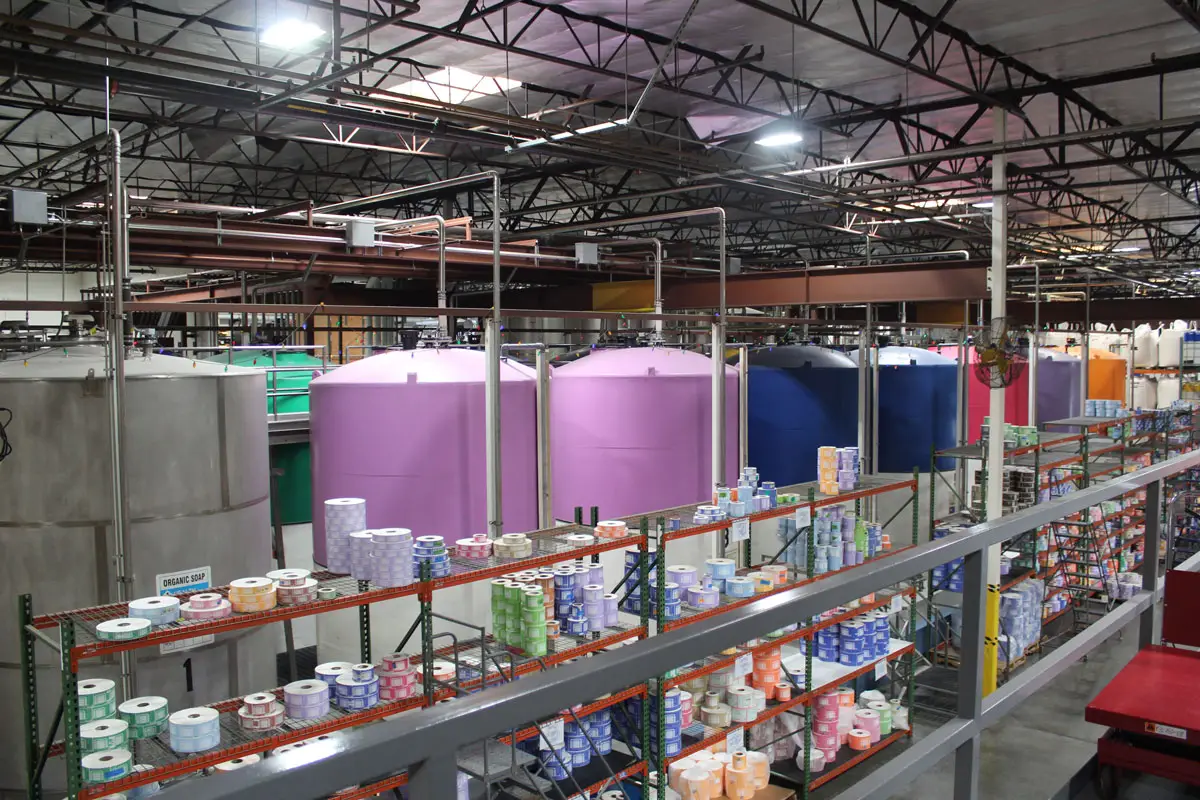
Lisa’s brother, David, stepped up to lead the company as CEO — with the financial guidance of their mother and company CFO Trudy — followed by their brother Michael, the company president. Lisa’s husband came on as COO in 2005, and she officially joined in 2008.
“When [Emanuel] died, he had no plans for succession,” Lisa Bronner said. “It rather suddenly came into my generation, and one by one, we all came to it… I think it’s important for any family business that everyone has that choice.”
Alongside its innovative improvements, the Vista factory also pays homage to its roots. One corner of the factory holds a display about the family’s soap-making history, which traces back to 1850s Germany.
At the center sits a large soap boiler, estimated to be well over 150 years old, used by the Heilbronner family in the early 1900s at their factory in Germany. The Jewish family was pushed out by the Nazis in 1938, but the current generation of Bronners was able to connect with the site’s owners, who shipped the giant machine to them.
Giving back to North County
Aside from its years of manufacturing operations, Dr. Bronner’s legacy can be seen in its various community contributions throughout Escondido and Vista.
One of the most prominent examples is the Boys and Girls Club of Greater San Diego, with whom Dr. Bronner’s has been an official partner for nearly 30 years, providing over $1 million in funding.
The late Jim Bronner was known for his passion for children, having grown up in the foster system himself. He served as a soccer coach at the Escondido branch, according to Lisa, and was a BGCGSD board member along with his wife, Trudy.
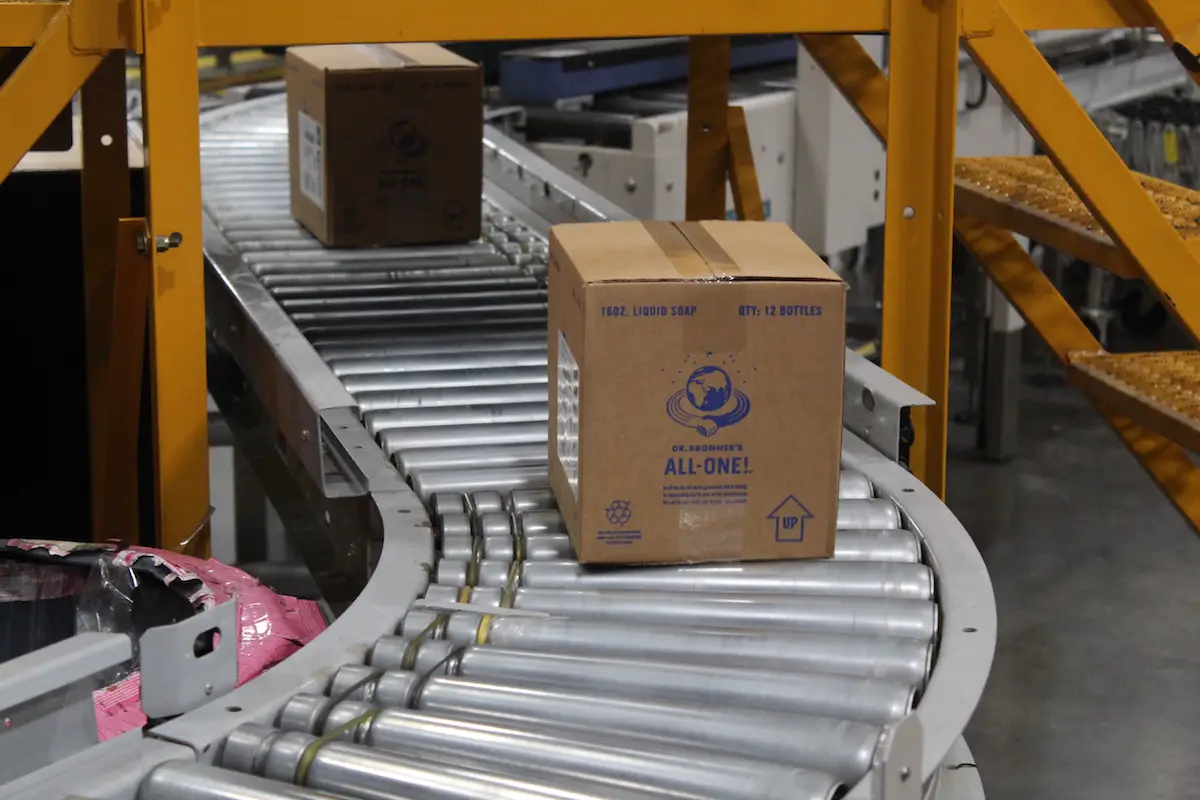
In the 1990s, Jim and his brother Ralph, who passed away in 2015, gave the organization a 1,000-acre plot of land that belonged to the company. The Boys and Girls Club was able to sell the property to be used as an environmental conservation site and then use the profits to establish another branch in Valley Center known as the James A. Bronner Family Branch.
Dr. Bronner’s is also an ongoing sponsor of the Moonlight Amphitheatre in Vista.
“My parents have always had the life principle of ‘you do what you can where you are.’ We’re a business, but we’re also members of the community,” Lisa Bronner said. “We have profits; some of them we need, but what we don’t need, we can use to better other efforts that need it.”
The company is an outspoken supporter of local and national initiatives, including various social justice campaigns, like leading the fight for hemp legalization, and focuses on using fair-trade and organic ingredients. They work closely with farms and suppliers in India, Ghana, Palestine, Israel, Sri Lanka and Ecuador.
Within the company, Dr. Bronner’s has also set a 5-to-1 salary cap for executives, meaning that the CEO’s salary is limited to five times that of the lowest-paid employee.
Lisa Bronner said transparency is one of the most important elements of the business, whether it comes to their ingredients, sourcing, labor practices, or causes they support.
“We really do lay it all out for people,” she said.

